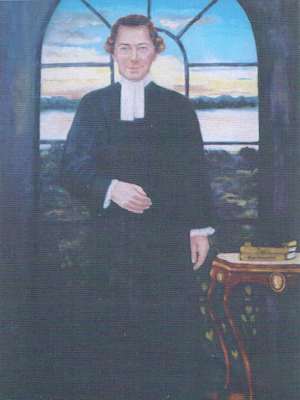 Archibald Campbell (1708-1774) emigrated to Virginia circa 1741. His family, who were members of the Scottish gentry, saw that he was well educated, possibly with a D.D. degree from Edinburgh University, although this cannot be confirmed. Early on he became a prominent member of the Westmoreland County gentry holding positions as Rector of Washington Parish, county magistrate, sheriff, schoolmaster, and prosperous landowner and planter.
Archibald Campbell (1708-1774) emigrated to Virginia circa 1741. His family, who were members of the Scottish gentry, saw that he was well educated, possibly with a D.D. degree from Edinburgh University, although this cannot be confirmed. Early on he became a prominent member of the Westmoreland County gentry holding positions as Rector of Washington Parish, county magistrate, sheriff, schoolmaster, and prosperous landowner and planter.
The colonial churches of Washington Parish including Round Hill, Mattox, Popes Creek and Brays disappeared before or soon after the Revolution. St. Peters in Oak Grove, built in 1847 now replaces them. Mr. Campbell was active throughout the county, owning land in Cople as well as Washington Parish. Most notably he occasionally also preached at Yeocomico.
Washington Parish Colonial records and information on Campbell’s school have been lost. However, it was as schoolmaster that Campbell made his most important contribution to posterity. It has been reliably reported that James Monroe, James Madison, John Marshall, and George Weeden attended his school. George Washington, Richard Henry Lee, and other teenagers were members of the parish. Monroe and Marshall mentioned their school days in their autobiographies. Monroe, a student for over four years, characterized Campbell as a man of “profound learning.”
Mr. Campbell, a noted Greek scholar, operated his classical boarding school at his home, the upper glebe of the parish. The site is now in King George County. He was said to be a disciplinarian of the sternest sort and his school had a reputation for academic excellence.
Mr. Campbell married 19-year old Rebekah Rawlings in 1753. She and their son Alexander died during childbirth in 1754. Both were buried at Round Hill Church. Their tombstone, the only relic of Mr. Campbell’s long tenure in Washington Parish is preserved and may be seen today at St. Peter’s Church. Mr. Campbell married again, and five children were born, some becoming well-noted citizens of the Commonwealth.
For nearly 30 years, Mr. Campbell served as Rector of Washington Parish. His death was reported on August 4, 1774. We do not know where he was buried. The academic and moral influence he had on his students. his parishioners, and the residents of the county, although impossible to measure, was positive, significant, and may have been the prime inspiration for Westmoreland’s many revolutionary heroes!
Excerpted from Manuscript (1988) by Otto Lorenz, Department of History, Kearney State College, Nebraska.
